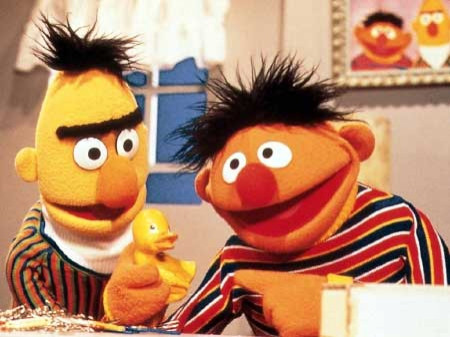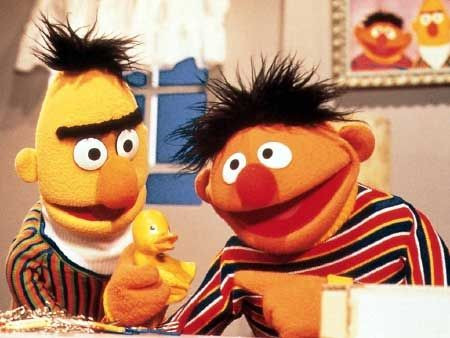New Yorker Bert & Ernie Gay Cover: Sesame Workshop’s Silence Is A Disservice To The LGBT Community
Opinion


The burning question of Bert and Ernie’s sexual orientation flared up again this weekend with the New Yorker’s celebratory cover illustration, which featured the famous fuzzy Muppets snuggling by the soft glow of a television set as they watched the Supreme Court overturn the Defense of Marriage Act.
The artfully executed image has garnered a mountain of praise, a bit of scorn, and a whole lot of head-scratching from pop-culture obsessives who for years have wondered whether the longtime roommates are or aren’t a homosexual couple. Unfortunately, the one entity that could settle the matter once and for all still refuses to do so, and that refusal is increasingly becoming a disservice to the gay community.
On Monday, a spokesperson for Sesame Workshop, the nonprofit organization that produces “Sesame Street,” told IBTimes that the group would not comment on the New Yorker cover. The organization’s silence is disappointing considering that its past attempts to address Bert and Ernie’s relationship status have only reinforced cultural inequalities toward gay people.
In 2007, Gary Knell, then-president of Sesame Workshop, hoped to put the issue to rest with the following comment: “They are not gay, they are not straight, they are puppets,” he wrote. “They do not exist below the waist.”
Not surprisingly, that didn’t satisfy the Bert-and-Ernie-are-gay camp. In 2011, a petition on Change.org called on Sesame Workshop and PBS to allow the characters to get married. Again, Sesame Workshop attempted to address the issue through deflection:
“Bert and Ernie are best friends. They were created to teach preschoolers that people can be good friends with those who are very different from themselves. Even though they are identified as male characters and possess many human traits and characteristics (as most Sesame Street Muppets do), they remain puppets, and do not have a sexual orientation.”
Both of these responses are wholly inadequate. First, let’s overlook the fact that puppets do have a sexual orientation, inasmuch as their characteristics indicate their identities. Even on “Sesame Street,” whose target audience consists largely of preschoolers, this is the case. Oscar the Grouch, for instance, has a lady friend named Grundgetta, the Count has the Countess, and Forgetful Jones has Clementine. Children don’t need to see scenes of these characters sucking each other’s faces to draw conclusions about their identities, and adults don’t think twice about seeing such relationships depicted.
What makes Sesame Workshop’s statements particularly insulting, though, is how they reduce LGBT identity to sex. Knell’s contention that Bert and Ernie are neither gay nor straight because they “do not exist below the waist” is entirely dismissive of the cultural shift that has taken place in this country over the past two decades. As should be obvious to anyone with a brain by now, being gay is not just about what goes on in the bedroom. And as more and more gays and lesbians live out in the open, all facets of society -- schools, children’s shows -- are going to have to confront homophobia not just as a means of discrimination against sexual preferences but as a function of invalidating certain lifestyles.
Incidentally, no one is suggesting that Sesame Workshop should give Bert and Ernie a double bed and have them smooch each other to sleep every night. Granted, it would be nice if “Sesame Street” writers allowed the characters to reveal that they are in a relationship -- thereby furthering the commitment to diversity that the program has shown in the past. But the Workshop is under no obligation to do so. Hell, it could be that Bert and Ernie are straight after all. Maybe they’re old college buddies sharing a room until the economy improves. The point is, Sesame Workshop should say one way or the other. To refuse to settle the matter is to knock the LGBT movement back to the time of “Don’t ask, don’t tell.” It’s a tightrope walk built around the idea that being gay is something to be ashamed of.
Since the New Yorker cover went viral on Friday, there’s been a lot of talk about not “sexualizing” childhood characters, but how are characters sexualized by merely acknowledging that they are in a committed relationship? Should “Sesame Street” feature no married characters at all? If not, say goodbye to Ingrid and Humphrey.
One of the most surefire ways to promote inequality is to stay silent. Sesame Workshop, the gatekeeper of the most groundbreaking children’s television show in history, has decided that silence is the best policy in regard to gay relationships. In doing so, it has summarily ruled that such relationships do not deserve the same acceptance and recognition as their straight counterparts.
One of these things is not like the other indeed.
Got a news tip? Send me an email. Follow me on Twitter: @christopherzara.
© Copyright IBTimes 2024. All rights reserved.






















